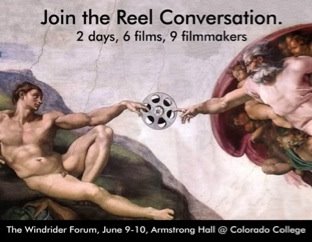
If St. Paul’s letters are not appropriate means of communicating the gospel, at least in it’s initial stages, what is? It’s a two-fold approach: from the Old Testament, the Wisdom books and from the New Testament, the Gospels.
The Proverbs tradition is one of cause and effect. Do this and this will happen. Don’t do this and this will be the result. Throughout the Wisdom books, the writers beg their readers to choose wisdom and discernment over foolishness and stupidity. Hard as these messages may be, they are still terribly relevant today. Actions--both good and bad--have consequences.
(Ecclesiastes and Job are also not afraid to admit that we live in a fallen and difficult world. They are not even afraid to paint saints angry at God for that pain. Christians lie when they insinuate that becoming a Christian masks one from the world’s pain and heartache. Agony is inevitable. We live in a difficult world. How we respond to that pain is what sets us apart. We must become wounded healers. We must take that pain and transform it to a blessing for others in similar pain.)
Jesus Christ’s life, witness, teachings and ministry is the starting point and springboard for all discussions, all conversions, all ministry. Any witness that does not start with Christ’s love and grace, but instead focuses on God’s wrath and condemnation is inappropriate and ineffectual.
We must begin with the fact that the kingdom of heaven is at hand and reinforce that with the fact that we live in a cause and effect universe. It’s a gospel message of both freedom and responsibility.
Some Christians like to use Phillipians 4:8 when defending their opinions that film is not something in which believers should be involved or participate: “Finally, brethren, whatever things are true, whatever things are noble, whatever things are just, whatever things are pure, whatever things are lovely, whatever things are of good report, if there is any virtue and if there is anything praiseworthy; meditate on these things.” They defend their position by saying that most films do not reflect purity or loveliness or justice, etc. But they almost always ignore the first trait listed--truth. Think on truth.
Many Christians criticize films for showing the darker side of humanity. But film, more often than not, is a cultural window--it reflects the world as it is, not as we’d like it to be. Life is dark, not film.
It is the difference between Descriptive Truth and Prescriptive Truth. Descriptive Truth reveals life as it is, warts and all. Prescriptive Truth reveals how those warts can be fixed and what a redeemed world looks like. Both are truth and both are necessary. One cannot work without the other and we present half-truths is we elevate one over another.
(Christians are just as guilty of false truth. Does anyone truly believe that “the good old days” were really all that good? Christians responding to a supposed slide in morality in films already base their opinions on a lie. The filmic world of the 40s and 50s--when dad and mom ate dinner in formal wear and slept in separate beds and whose children never really misbehaved--was an invention, a lie to begin with. It never existed. Christians have been measuring the decline of film and the world in general by a construct, a fake world that never existed in the first place. They are angry and want to exchange one Hollywood illusion for another.)
What then makes a good film, much less a good “Christian” film?
Following the delineations (minus the theological implications) mapped out by John Boorstin in his definitive, “Making Movies Work” we discussed the three ways in which a film must operate for it to be effective.
Firstly, film must work
voyeuristically. This is what the mind’s eye sees. Filmmakers achieve this through cinematography and production design. It has the ability to transport us to other worlds, another time and place, to drop us into other cultures to reveal lives and experiences wholly outside our own. If the integrity of the film’s time and place is genuine and believable, the audience will buy into it.
Secondly, film must work
vicariously. This is what the heart’s eye sees and is achieved primarily through the use of the musical score, the screenplay, and, of course, lives and dies with the acting. Is the film emotionally believability, does it create empathy, does it inspire character identification?
Lastly, film must work
viscerally. This is what the senses see--the unexplainable gut reaction, the thrill, exhilaration, tension, fear, pain. This sort of psychosomatic response is inspired by the intensity of the imagery and is rarely even something which the viewer is in control of. The film’s editing makes or breaks the visceral reaction.
The best films work on all three levels simultaneously. Usually, if you walk away from a film disappointed, it is probably because the film miss-fired on one of these levels. When a film does nail all three, you leave the theater elated, overcome, emotionally spent, inspired.
It is a holistic approach to filmmaking. It involves the whole person--mind, body and spirit. It is, in a word, Trinitarian. (This also explains why you can leave the theater Saturday night feeling like you have had a genuine, transcendent experience and leave church Sunday morning feeling dull and uninspired!)
But to be able to speak into the lives of non-Christians, we must be willing to first let them speak to us. We must be willing to dialogue with them. We must be willing to hear what they have to say.
Act 17:16 reveals St. Paul in the Athenian marketplace. He is not there to protest their religious writings and traditions. He is not there to boycott their pagan shrines. Quite the opposite. He studied their traditions and beliefs and used them as a starting place with which to begin a thoughtful dialogue about truth. He engaged them in a the marketplace, in a neutral space. He didn’t enter with judgement, but in an interest to have a honest conversation.
We don’t come alongside the culture for relevance sake. We do it because we honestly want and need to hear what culture is saying. We need to hear it’s heart’s cry. Why? Because we have been given the antidote to that pain--the thing in the person of Jesus Christ who will see us through that pain to the other side.
But, at the same time, we must stop counting conversions and start counting conversations. God does all the work. We are merely the movers and shakers who set the stage.
We cannot manipulate transcendence or transformation. But we can create an environment that will give transcendence its best shot. Filmmakers who wish to convey God must first learn to master the art of creating a “wondrous” environment. Then they must discipline themselves to keep their own hands out of it. We mustn't try to conclude someone’s experience. Human nature desperately seeks meaning, and though it is tempting to consistently place meaning on art, we must allow space for someone’s experience to continue and let them own it and further it at their own pace--at God’s own pace.
We need to stop trying to always analyze everything. Feel. Stay in the moment. Savor it. Live in it. Sometimes the heart can understand so much better than the brain. Sometimes the most real experiences are those that are the most unreal. Transcendence speaks to our real selves--not simply our selves trapped in human flesh, but our eternal selves, our souls. It may not be real, but it is truthful.
These are the sorts of films I hope to make in the future. Films that speak to the human condition. Films that reflect both the truth of the world in which we live, no matter how grimy that world, and the truth of God’s power to work in and through that world to bring about the sort of utter transformation only He can bring. You will not find altar calls in my films. You will find catalysts--inception points for God to begin working. I am not interested in concluding the conversation--that is not my job--I am interested in beginning the conversation. Hope, faith, love, redemption, forgiveness, grace, beauty, truth, wonder, mystery--these are what I want to make films about and they will, no doubt, take many forms and shapes. They may not, like the book of Ruth, ever mention the name of God, but He will be present in every sacramental frame--pervading and sustaining everything.







